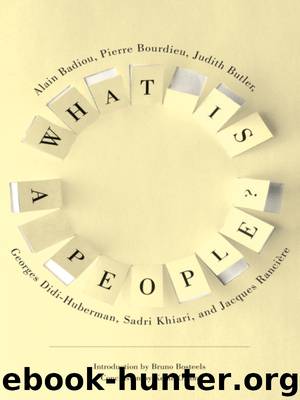What Is a People? by Alain Badiou

Author:Alain Badiou
Language: eng
Format: epub
Tags: PHI040000, Philosophy/Movements/Critical Theory, PHI019000, Philosophy/Political
Publisher: Columbia University Press
Published: 2016-05-02T16:00:00+00:00
Approaching, Documenting, Rendering Sensible
To approach politics through the multiple opportunities of a “litigation introduced over the allotment of the sensible,” as Jacques Rancière would have it: isn’t this to end up by “aestheticizing the political”—the worst thing in the eyes of Walter Benjamin (because that was what the fascist regimes of his time did, with great pomp), something for which we can, in any case, occasionally reproach the author of Partage du sensible? The answer to this question is very simple: it is that aesthetics itself designates a field of conflicts, a division that many other words have crossed over, for example when we want to hear in the word people (the famous, the overrepresented in the glitter market) all those from which the peoples are, rightly, excluded; or when we want to hear in the word image (the medium for fame, for overrepresentation in glitter) all that the images know, rightly, to contest. What is the meaning then of the word aesthetic when Jacques Rancière does not hesitate to write that “the emancipation of workers was first of all an aesthetic revolution: the gap opened in relationship to the sensible universe ‘imposed’ by a condition”?44
We are a long way here from the aesthetic that chooses for its subjects the “criteria of art” or of beauty—what Carl Einstein denounces as the ridiculous “beauty contests”—dear to academic institutions. The aesthetic we are talking about from now on is a kind of knowledge that chooses for subjects the events of the sensible, regardless of whether or not they are “artistic.” Now, to better describe them, we need not only that philosophical criticism developed by Jacques Rancière, among others, but also a true anthropology that would benefit from being informed by the “techniques of the body” (according to the lesson of Marcel Mauss), the “formulas of pathos” (according to the lesson of Aby Warburg), or the “thymic moments” (according to the lesson of phenomenological descriptions, like those of Ludwig Binswanger for example). But in order to describe, one must first know how to write, that is, to take a position—literary, aesthetic, ethical—in the language, that vast field of conflicts where the most reductive and most open usages are encountered, the worst slogans and the best questionings. An anthropology of sensible events begins from the moment when one agrees to approach through looking, through listening, through writing, even if it means renouncing the apodictic claims of the metaphysics of school:
Download
This site does not store any files on its server. We only index and link to content provided by other sites. Please contact the content providers to delete copyright contents if any and email us, we'll remove relevant links or contents immediately.
The Secret History by Donna Tartt(19034)
The Social Justice Warrior Handbook by Lisa De Pasquale(12183)
Thirteen Reasons Why by Jay Asher(8885)
This Is How You Lose Her by Junot Diaz(6873)
Weapons of Math Destruction by Cathy O'Neil(6261)
Zero to One by Peter Thiel(5784)
Beartown by Fredrik Backman(5734)
The Myth of the Strong Leader by Archie Brown(5495)
The Fire Next Time by James Baldwin(5426)
How Democracies Die by Steven Levitsky & Daniel Ziblatt(5211)
Promise Me, Dad by Joe Biden(5141)
Stone's Rules by Roger Stone(5080)
A Higher Loyalty: Truth, Lies, and Leadership by James Comey(4947)
100 Deadly Skills by Clint Emerson(4915)
Rise and Kill First by Ronen Bergman(4776)
Secrecy World by Jake Bernstein(4739)
The David Icke Guide to the Global Conspiracy (and how to end it) by David Icke(4697)
The Farm by Tom Rob Smith(4501)
The Doomsday Machine by Daniel Ellsberg(4482)
